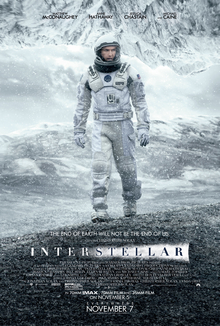
Interstellar is an epic science fiction film that, though reminiscent of classic earlier sci-fi such as 2001: A Space Odyssey, speculates on what happens after such modern crises as climate change, over-population, and food/crop failures have wrought foreseeable death to the human species on planet Earth. The focus is not particularly on these hot and very real issues, nor is any time given to explore how to fix our planet before fleeing off into space. You get the idea that it’s just too late for all that. As Dylan Thomas’s poem is echoed often throughout the film, “Do Not Go Gentle into that Good Night,” it’s apparent that humans are on the cusp of death and must find another home. But we aren’t going to go down easy, even if it means traveling through space and time.
While I won’t spoil the film for anyone (go see it!), there are some very touching moments that focus on love as that extra dimension to life that is definitely quantifiable. The outer-space scenes are artistically tranquil at times, serene, unbelievable–yet at other times are chaotically grand. It is truly a film about going to the ends of the galaxy (and into the next one) to find hope for our survival. Yet, when it comes down to it, there are just a couple options: save self or sacrifice self while saving the species. Which option will take place? Plan A or plan B?
While I watched the film, engrossed as I was in its beauty and well-acted story, I couldn’t help but think: It’s not too late to save ourselves here, right here, right now, on planet Earth. To stay. There is no planet B. But to be fair, the film had its own purpose–to explore space in a post-apocalyptic setting. We are not quite there yet, but can be, might be, soon.